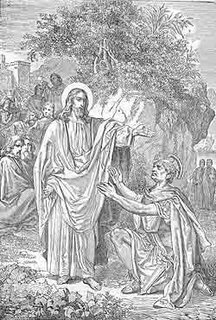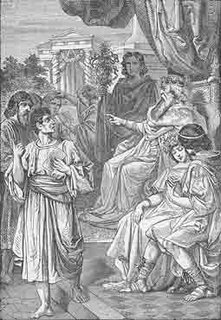 TWENTIETH SUNDAY AFTER PENTECOST
TWENTIETH SUNDAY AFTER PENTECOSTFr Goffine "Divine Instructions" after www.truecatholic.org
The Introit of the Mass is an humble prayer, by which we acknowledge that we are punished for our disobedience:
INTROIT All that thou hast done to us, O Lord, thou hast done in true judgment: because we have sinned against thee, and have not obeyed thy commandments: but give glory to thy name, and deal with us according to the multitude of thy mercy. (
Dan. III. 28.) Blessed are the undefiled in the way: who walk in the law of the Lord. (
Fs. CXVIII.). Glory etc.
COLLECT Grant, we beseech Thee, O Lord, in Thy mercy to Thy faithful pardon and peace; that they may both be cleansed from all their offences, and serve Thee with a quiet mind. Through Christ Our Lord.
EPISTLE (
Ephes. V. 15-21.)
Brethren, See how you walk circumspectly, not as unwise, but as wise redeeming the time, because the days are evil. Wherefore, become not unwise, but understanding what is the will of God. And be not drunk with wine, wherein is luxury: but be ye filled with the Holy Spirit, speaking to yourselves in psalms and hymns, and spiritual canticles, singing and making melody in your hearts to the Lord: giving thanks always for all things, in the name of our Lord Jesus Christ, to God and the Father; being subject one to another in the fear of Christ.
How may we redeem time?By employing every moment to gain eternal goods, even should we lose temporal advantages thereby; by letting no opportunity pass without endeavoring to do good, to labor and, suffer for love of God, to improve our lives, and increase in virtue. Do you wish to know, says the pious Cornelius á Lapide, how precious time is: Ask the damned, for these know it from experience. Come, rich man, from the abyss of hell, tell us what you would give for one year, one day, one hour of time! I would, he says, give a whole world, all pleasures, all treasures, and bear all torments. O, if only one moment were granted me to have contrition for my sins, to obtain forgiveness of my crimes, I would purchase this moment with every labor, with any penance, with all punishments, torments and tortures which men ever suffered in purgatory or in hell, even if they lasted hundreds, yes, thousands of millions of years! O precious moment upon which all eternity depends! O, how many moments did you, my dear Christian, neglect, in which you could have served God, could have done good for love of Him, and gained eternal happiness by them, and you have lost these precious moments. Remember, with one moment of time, if you employ it well, you can purchase eternal happiness, but with all eternity you cannot purchase one moment of time!
ASPIRATION Most bountiful God and Lord! I am heartily sorry, that I have so carelessly employed the time which Thou hast given me for my salvation. In order to supply what I have neglected, as far as I am able, I offer to Thee all that I have done or suffered from the first use of my reason, as if I had really to do and suffer it still; and I offer it in union with all the works and sufferings of our Saviour, and beg fervently, that Thou wilt supply, through His infinite merits, my defects, and be pleased with all my actions and sufferings.
Be not drunk with wine, wherein is luxury![On the vice of drunkenness see the third Sunday after Pentecost Here we will speak only of those who make others drunk by encouragement.] The Persian King Assuerus expressly forbade that any one should be urged to drink at his great banquet. (
Esth. I. 8.) This heathen who knew from the light of reason, that it is immoral to lead others to intemperance, will one day rise in judgment against those Christians who, enlightened by the light of faith, would not recognize and avoid this vice. Therefore the Prophet Isaias (
V. 22.) pronounces woe to those who are mighty in drinking and know how to intoxicate others; and St. Augustine admonishes us, by no means to consider those as friends, who by their fellowship in drinking would make us enemies of God.
GOSPEL (
John IV. 46-53.)
At that time, There was a certain ruler whose son was sick at Capharnaum. He having heard that Jesus was come from Judea into Galilee, went to him, and prayed him to come down, and heal his son; for he was at the point of death. Jesus therefore said to him: Unless you see signs and wonders, you believe not. The ruler saith to him: Lord, come down before my son die. Jesus saith to him: Go thy way, thy son liveth. The man believed the word which Jesus said to him, and went his way. And as he was going down, his servants met him, and they brought word, saying that his son lived. He asked therefore of them the hour wherein he grew better. And they said to him: Yesterday at the seventh hour the fever left him. The father therefore, knew that it was at the same hour that Jesus said to him: Thy son liveth: and himself believed. and his whole house.
INSTRUCTIONSI.God permitted the son of the ruler to become sick that he might ask Christ for the health of his son, and thus obtain true faith and eternal happiness. In like manner, God generally seeks to lead sinners to Himself, inasmuch as He brings manifold evils and misfortunes either upon the sinner himself or on his children, property, etc. Hence David said: It is good for me that thou hast humbled me, that I may learn thy justifications, (
Ps. CXVIII. 71.) and therefore he also asked God to fill the faces of sinners with shame, that they should seek His name. (
Ps. LXXXII. 17.) This happened to those of whom David says: Their infirmities were multiplied: afterwards they hastened in returning to God. (
Ps. XV. 4.) O would we only do the same! When God sends us failure of crops, inundations, hail-storms, dearth, war, etc., He wishes nothing else than that we abandon sin and return to Him. But what do we? Instead of hastening to God, we take refuge in superstition, or we murmur against Him, find fault with or even blaspheme His sacred regulations; instead of removing our sins by sincere penance, we continually commit new ones, by murmuring and impatience, by hatred and enmity, by rash judgments, as if the injustice and malice of others were the cause of our misfortune. What will become of us if neither the benefits nor the punishments of God make us better?
II. Christ said to this ruler: Unless you see signs and wonders, you believe not. This was a reprimand for his imperfect faith; for if he had truly believed Christ to be the Son of God, he would not have asked Him to come to his house, but, like the centurion, would have believed Him able, though absent, to heal His son. (
Matt. VIII.) Many Christians deserve the same rebuke from Christ, because they lose nearly all faith and confidence in God, when He does not immediately help them in their troubles, as they wish. He proves to us how displeasing such a want of confidence is to Him by withdrawing His assistance and protection from the fickle and distrustful. (
Ecclus. II. 15.)
II. How much may not the example of the father of a family accomplish! This ruler had no sooner received the faith, than his whole household was converted and believed in Christ. Fathers and mothers by their good example, by their piety, frequent reception of the Sacraments, by their meekness, temperance, modesty and other virtues, may accomplish incalculable good among their children and domestics.
CONSOLATION IN SICKNESSThere was a certain ruler whose son was sick. (John IV. 16.)
As a consolation in sickness, you should consider that God sends you this affliction for the welfare of' your soul, that you may know your sins; or if you be innocent, to practice patience, humility, charity, etc., and increase your merits. Therefore a holy father said to one of his companions, who complained, because he was sick: "My son! if you are gold, then you will be proved by sickness, but if you are mixed with dross, then you will be purified." "Many are vicious in health," says St. Augustine, "who would be virtuous in sickness;" and St. Bernard says: "It is better to arrive at salvation through sickness, than to have health and be damned."It is also a powerful means of consolation in sickness, to represent to ourselves the suffering Redeemer, who had no soundness from the top of His head to the sole of His foot, and contemplating whom St. Bonaventure used to cry out: "O Lord, I do not wish to live without sickness, since I see Thee wounded so much." When sick, we should carefully examine, whether we possess any ill-gotten goods, or have any other secret sin on our conscience; and if we are conscious of any, we should quickly free ourselves from it by a contrite, sincere confession, and by restoring the things belonging to others. Sins are very often the cause of disease, and God does not bless the medicine unless the sickness effects its object, that is, the sinners amendment. Still less can we expect help, but rather temporal and eternal misfortune, if we have recourse to superstition, and spells, as the King Ochozias experienced, who was punished with death, because in sickness he had recourse to the idol Beelzebub. (
IV Kings I.)
PRAYER O Jesus, Thou true physician of souls, who dost wound and heal us, yea, dost even permit sorrows and adversities to visit us that our souls may have health, grant us the grace to use every bodily pain according to Thy merciful designs for the promotion of our salvation.
INSTRUCTION ON CARE OF THE SICKCome down before my son die. (John IV. 49.)All who have the charge of sick persons, should be like this father, that is, they should first of all endeavor to call upon Jesus to come in the most holy Sacrament, before the sick person is unable to receive Him. The devil seeks to hinder nothing more than this. He excites the imagination of the sick person, making him believe that he can live longer, that he will certainly get well again, in order to ruin him easier afterwards, because he defers his conversion. Those contribute to this end who through fear of frightening the sick person or of annoying him, fail to call the priest at the right time. This is cruel love, which deprives the sick person of the salvation of his soul and eternal happiness, and brings with it a terrible responsibility. Where there is question of eternity, no carefulness can be too great. We should, therefore, choose the safest side, because the suffering may easily increase and finally make the sick person unable to attend to the affairs of his soul. We should, therefore, not conceal from him the danger in which he is, and if he has still the use of his reason, should call in the priest that he may receive the Last Sacraments. He will not die sooner on that account, but rather derive the greatest benefit therefrom, since his conscience will be cleansed from sin, which may be the cause of his sickness, and perhaps, he may regain his health, or at least be strengthened by the newly received grace of God, to bear his pains with greater patience and to die far easier, securer, and more consoled. We should also endeavor to encourage the sick person to resignation, and a childlike confidence in God, should pray with him to strengthen him against desponding thoughts, and the temptations of the devil; we should present him a crucifix to kiss; repeat the holy names of Jesus, Mary and Joseph, and other consolatory ejaculations, such as are found in prayer-books; should sign him with the sign of the cross; sprinkle him with holy water, and above all pray for a happy death. We should not weep and lament, by which death is only made harder for him, nor should we hold useless, idle and worldly conversations with him which will prevent him from thinking of God arid the salvation of his soul, and from preparing himself for the last dangerous struggle. Finally, we should by no means suffer in his presence persons who have given him occasions of committing sin, because they would be obstacles to his sincere conversion.
There is truly no greater work of charity than to assist our neighbor to a happy death.
Read whole post......
 SCRIPTURE CORNER
SCRIPTURE CORNER 






































